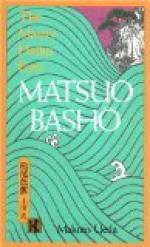|
This section contains 2,042 words (approx. 7 pages at 300 words per page) |

|
SOURCE: “Bashō,” in Haiku, Hokuseido, 1951, pp. 328-36.
In the following excerpt, Blyth maintains that Bashō sought to convey in his poetry the greatness of ordinary life, as it honors the mind and body and the particularities of the fleeting world. This essay originally contained ideographic characters, which have been silently removed for this reprinting.
There are three great names in the history of haiku, Bashô, Buson and Issa; we may include a fourth, Shiki. Bashô is the religious man, Buson the artist, Issa the humanist. Bashô is concerned with God as he sees himself in the mind of the poet before flowers and fields. Buson deals with things as they exist by and for themselves, in their own right. Issa is concerned with man, man the weak angel; with birds and beasts as they struggle like us to make a living and keep their heads above water. If...
|
This section contains 2,042 words (approx. 7 pages at 300 words per page) |

|


